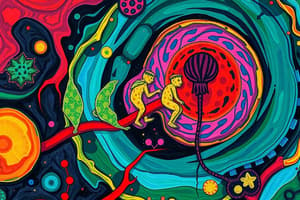Podcast
Questions and Answers
What characteristic of life describes organisms' ability to respond to environmental changes?
What characteristic of life describes organisms' ability to respond to environmental changes?
- Sensitivity or Response to Stimuli (correct)
- Homeostasis
- Metabolism
- Adaptation
Which characteristic of life refers to the genetic instructions guiding an organism's growth and development?
Which characteristic of life refers to the genetic instructions guiding an organism's growth and development?
- Order
- Growth and Development (correct)
- DNA/RNA
- Reproduction
What term is used to describe the total of all chemical processes occurring within an organism?
What term is used to describe the total of all chemical processes occurring within an organism?
- Order
- Reproduction
- Homeostasis
- Metabolism (correct)
What defines how well organisms maintain a stable internal environment despite external changes?
What defines how well organisms maintain a stable internal environment despite external changes?
Which characteristic of life indicates the presence of organized structures in organisms?
Which characteristic of life indicates the presence of organized structures in organisms?
Can an entity still be considered living if it lacks some characteristics of life?
Can an entity still be considered living if it lacks some characteristics of life?
Which of the following is NOT considered a characteristic of life?
Which of the following is NOT considered a characteristic of life?
What is the basic structural unit of life?
What is the basic structural unit of life?
Which biological molecule is primarily involved in energy storage?
Which biological molecule is primarily involved in energy storage?
During which process do cells replicate their genetic material?
During which process do cells replicate their genetic material?
Which of the following processes converts light energy into chemical energy?
Which of the following processes converts light energy into chemical energy?
Which type of cell is exclusively involved in sexual reproduction?
Which type of cell is exclusively involved in sexual reproduction?
What structure regulates the movement of substances in and out of a cell?
What structure regulates the movement of substances in and out of a cell?
Which type of biological molecule includes enzymes and antibodies?
Which type of biological molecule includes enzymes and antibodies?
Which process results in the formation of two identical daughter cells?
Which process results in the formation of two identical daughter cells?
Study Notes
Characteristics of Life
- All living organisms are highly organized structures made up of one or more cells.
- Organisms respond to diverse stimuli, like bending toward light or moving towards or away from chemicals (chemotaxis) or light (phototaxis).
- Organisms reproduce by duplicating their DNA and dividing to form new cells.
- Multicellular organisms produce specialized reproductive cells.
- All living organisms exhibit adaptations to their environment.
- Organisms grow and develop according to instructions coded in their genes.
- Cells require specific conditions like appropriate temperature, pH, and chemical concentrations to function properly.
- All organisms have genetic material (DNA/RNA).
- Metabolism is the sum of all processes taking place inside an organism's body.
Cells
- The basic unit of life is a cell.
- Cells are organized into organelles, each with a specific function.
- There are different types of cells, including prokaryotic and eukaryotic cells.
Cell Diversity
- Cells vary in size, shape, and function, reflecting their roles in the organism.
Cell Membrane
- The cell membrane controls what enters and leaves the cell.
Cell Division
- Cell division allows organisms to grow, repair tissues, and reproduce.
- Mitosis is a type of cell division that produces two identical daughter cells.
- Meiosis is a type of cell division that produces four gametes (sex cells) with half the number of chromosomes.
Biological Molecules
- Carbs provide energy and structural support.
- Proteins are involved in various functions, including building structures, transporting substances, and catalysing reactions.
- Lipids store energy and form cell membranes.
- Nucleic acids carry genetic information.
Energy Processing
- Photosynthesis is the process by which plants use sunlight to convert carbon dioxide and water into glucose and oxygen.
Studying That Suits You
Use AI to generate personalized quizzes and flashcards to suit your learning preferences.
Related Documents
Description
This quiz covers essential concepts related to the characteristics of life and cellular structure. Test your knowledge on how organisms grow, reproduce, and respond to their environment, as well as the types of cells and their organization. Perfect for biology students looking to reinforce their understanding of life sciences.




